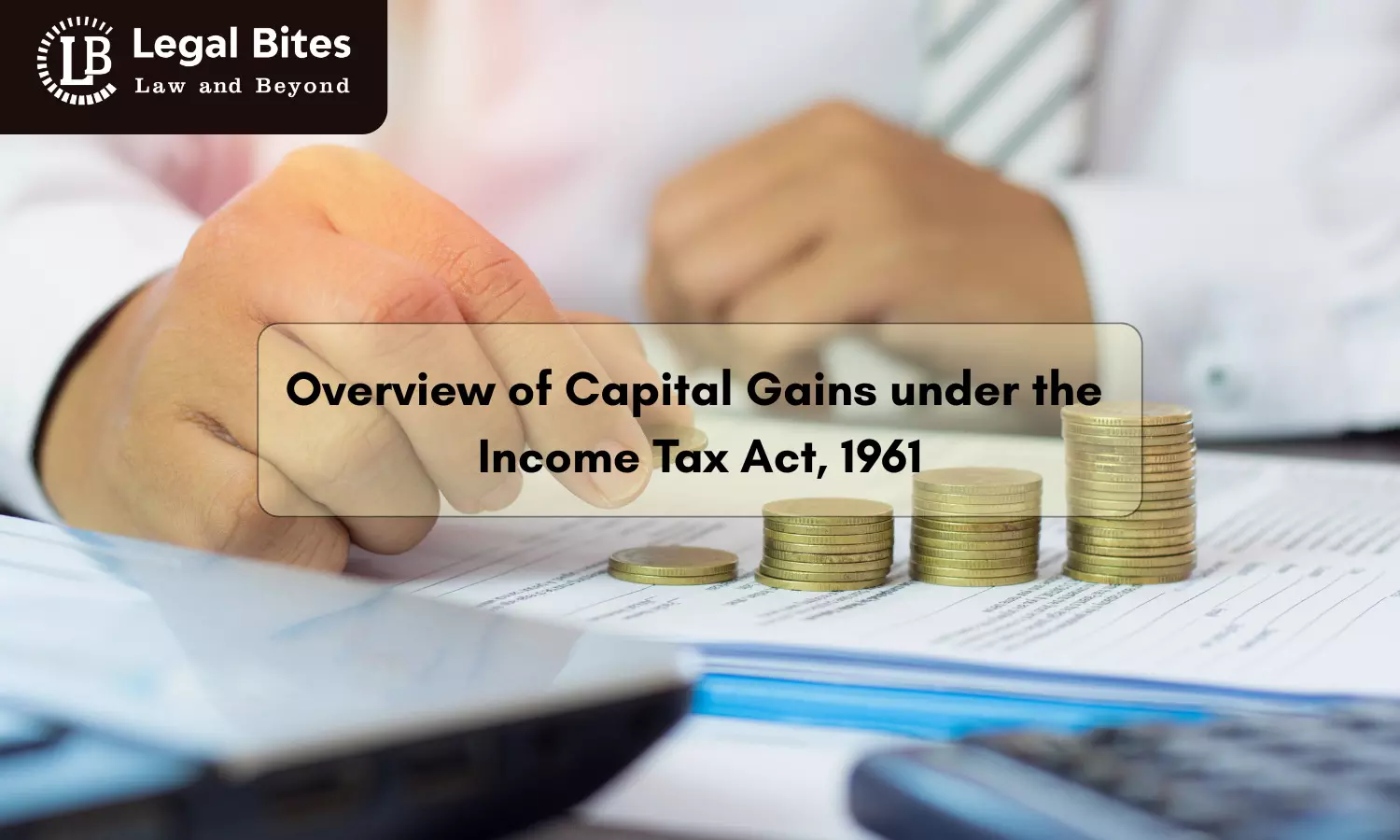Overview of Capital Gains under the Income Tax Act, 1961
Confused about how capital gains are taxed? Learn the essentials of LTCG, STCG, and exemptions like Section 54 and 54EC with updates from Budget 2025.

Capital gains refer to the profit or gain arising from the transfer of a capital asset. Under the Income Tax Act, 1961, such gains are chargeable to tax in the year in which the transfer of the capital asset takes place. Capital gains can arise from the sale of property, shares, bonds, mutual funds, and other capital assets. This article comprehensively covers the classification, computation, exemptions, and recent amendments governing capital gains taxation in India.History of Capital...
Capital gains refer to the profit or gain arising from the transfer of a capital asset. Under the Income Tax Act, 1961, such gains are chargeable to tax in the year in which the transfer of the capital asset takes place. Capital gains can arise from the sale of property, shares, bonds, mutual funds, and other capital assets. This article comprehensively covers the classification, computation, exemptions, and recent amendments governing capital gains taxation in India.
History of Capital Gains Taxation in India
Capital gains tax was first introduced in India through the 1947 Budget by inserting Section 12B in the Indian Income-tax Act, 1922. It aimed to curb speculative trading in a post-war inflationary economy. However, it was withdrawn after two years due to its negative impact on the stock market. The tax was reintroduced by the Finance (No. 3) Act of 1956 on the recommendation of economist Nicholas Kaldor, emphasising equitable taxation and revenue generation. Since then, capital gains tax has remained a key part of India's tax framework.
Definition of Capital Asset
Section 2(14) of the Income Tax Act, 1961 defines a capital asset as:
"Property of any kind held by an assessee, whether or not connected with his business or profession."
Exclusions from Capital Asset
The term does not include:
Stock-in-trade
Personal effects (excluding jewellery, paintings, etc.)
Agricultural land in rural areas
Gold deposit bonds under the Gold Monetisation Scheme
Types of Capital Gains
Capital gains are classified into two types based on the holding period:
Short-Term Capital Gains (STCG)
A short-term capital asset, as defined under Section 2(42A) of the Income Tax Act, 1961, refers to an asset that is held by an assessee for not more than 36 months immediately preceding the date of its transfer.
Exceptions:
- Listed securities, equity mutual fund units, UTI units, and zero-coupon bonds are considered short-term if held for not more than 12 months.
- Unlisted shares or units of specified mutual funds transferred between 1st April 2014 and 10th July 2014 are also considered short-term if held for up to 12 months.
- For unlisted shares and immovable property (land or building or both), the short-term period is up to 24 months.
Long-Term Capital Gains (LTCG)
A long-term capital asset is one held for a period exceeding the above-mentioned limits based on asset class. If the asset is held beyond the prescribed threshold, the gain arising is considered a Long-Term Capital Gain (LTCG). [Sections 2(29A) & 2(29B)]
Computation of Capital Gains
Capital gains are computed as:
Short-Term Capital Gain (STCG):
STCG = Full Value of Consideration − ( Cost of Acquisition + Cost of Improvement + Expenses on Transfer)
Long-Term Capital Gain (LTCG):
LTCG = Full Value of Consideration − (Indexed Cost of Acquisition + Indexed Cost of Improvement + Expenses on Transfer)
Indexation: Adjusts the cost of acquisition/improvement based on the Cost Inflation Index (CII), notified by the CBDT.
Tax Rates on Capital Gains
Long-Term Capital Gains (LTCG)
- Tax Rate: 12.5% without indexation for transfers on or after July 23, 2024.
- Exemption Limit: Increased to ₹1.25 lakh per financial year for gains on listed equity shares and equity-oriented mutual funds.
- Special Provision for Residents: For land or buildings acquired before July 23, 2024, resident individuals and HUFs can opt for the earlier regime—20% tax with indexation—if it results in a lower tax liability.
Short-Term Capital Gains (STCG)
- Listed Equity Shares & Equity-Oriented Mutual Funds: Taxed at 20% for transfers on or after July 23, 2024.
- Other Assets: Taxed at the individual's applicable income tax slab rates.
Exemptions on Capital Gains (Sections 54 to 54GB)
| Section | Asset Sold | New Investment | Conditions | Exemption |
|---|---|---|---|---|
| 54 | Residential property | New residential house | Individual/HUF | LTCG |
| 54B | Agricultural land | New agricultural land | Individual/HUF | LTCG or STCG |
| 54EC | Any LTC asset | NHAI/REC bonds (within 6 months) | ₹50 lakh limit | LTCG |
| 54F | Other than residential house | New residential house | Individual and HUF | LTCG |
| 54GB | Residential property | Equity in eligible startup | Individual and HUF | LTCG |
Set-off of Loss from One Source against Income from Another Source (Same Head) (Section 70)
- If an assessee incurs a loss from one source of income under a particular head (except capital gains), that loss can be set off against income from another source under the same head.
- Short-term capital loss can be set off against short-term or long-term capital gains.
- Long-term capital loss can be set off only against long-term capital gains.
Set-off of Loss from One Head against Income from Another Head (Section 71)
- If there is a loss under one head of income (except capital gains) and no income under capital gains, such loss can be set off against income under any other head.
- If capital gains income exists, loss under other heads can also be set off against it (subject to conditions).
However:
- Business loss cannot be set off against salary income.
- Capital loss cannot be set off against income from other heads.
- Loss under “Income from House Property” exceeding ₹2,00,000 cannot be set off against other heads of income.
Deemed Cost of Acquisition in Special Capital Gains (Section 49)
Real Estate Project Share [Sec 45(5A)]:
Cost of acquisition = Full value of consideration deemed under Section 45(5A), excluding cases under its proviso.
Assets of Trusts/Institutions [Sec 115TD]:
Cost of acquisition = Fair Market Value (FMV) used to compute accreted income on the specified date.
Specified Capital Assets [Sec 28(via)]:
Cost of acquisition = FMV considered under clause (via) of Section 28.
Filing and Reporting of Capital Gains
- Income from capital gains must be disclosed in Schedule CG of ITR.
- Form 26AS and AIS (Annual Information Statement) help in tracking gains from securities and immovable property.
Capital Gains Tax Regime Remains Unchanged in Budget 2025
Budget 2025 has made no changes to the existing capital gains tax structure. The simplified regime introduced on 23 July 2024 continues, categorising assets into listed securities and unlisted/non-financial securities, each with distinct holding period criteria for determining short-term or long-term gains.
While the Finance (No. 2) Act, 2024 introduced a 12.5% tax rate for long-term capital gains without indexation for assets transferred after 23 July 2024, it also offered relief to resident individuals and HUFs—ensuring they pay no more than 20% after indexation for qualifying long-term assets (land/buildings acquired before the cut-off date).
Capital Gains Excluded: New Tax Regime Benefits Apply Only to Regular Income
Under the new tax regime, individuals with income up to ₹12 lakh (excluding special rate income like capital gains) will pay zero tax due to the combined benefits of slab rate reduction and rebate. For higher incomes, substantial relief is also provided:
- ₹12 lakh income: ₹80,000 tax saved (100% rebate)
- ₹18 lakh income: ₹70,000 tax saved (30% rebate)
- ₹25 lakh income: ₹1,10,000 tax saved (25% rebate)
Conclusion
Capital gains tax plays a crucial role in the Indian tax regime. With regular changes and emerging asset classes like digital assets, mutual funds, and startups, understanding the nuances of capital gain taxation has become essential for investors, property owners, and professionals. The government’s intent to streamline and plug loopholes is evident through recent legislative amendments such as capping exemptions and changes in debt fund taxation. Taxpayers must remain vigilant about updates to avail exemptions lawfully and plan their transactions efficiently.
References
[1] Income Tax Act, 1961
[2] Budget 2025-2026, Available Here
[3] Income under the Capital Gains, Available Here
[4] Has STCG, LTCG taxation changed in new Income Tax Bill, 2025?, Available Here
Important Link

Ananya Gupta
Ananya is an alumnus of the prestigious Government Law College, Mumbai, specializing in Corporate Law. A passionate legal scholar, she is deeply involved in research, focusing on corporate governance and regulatory frameworks.
